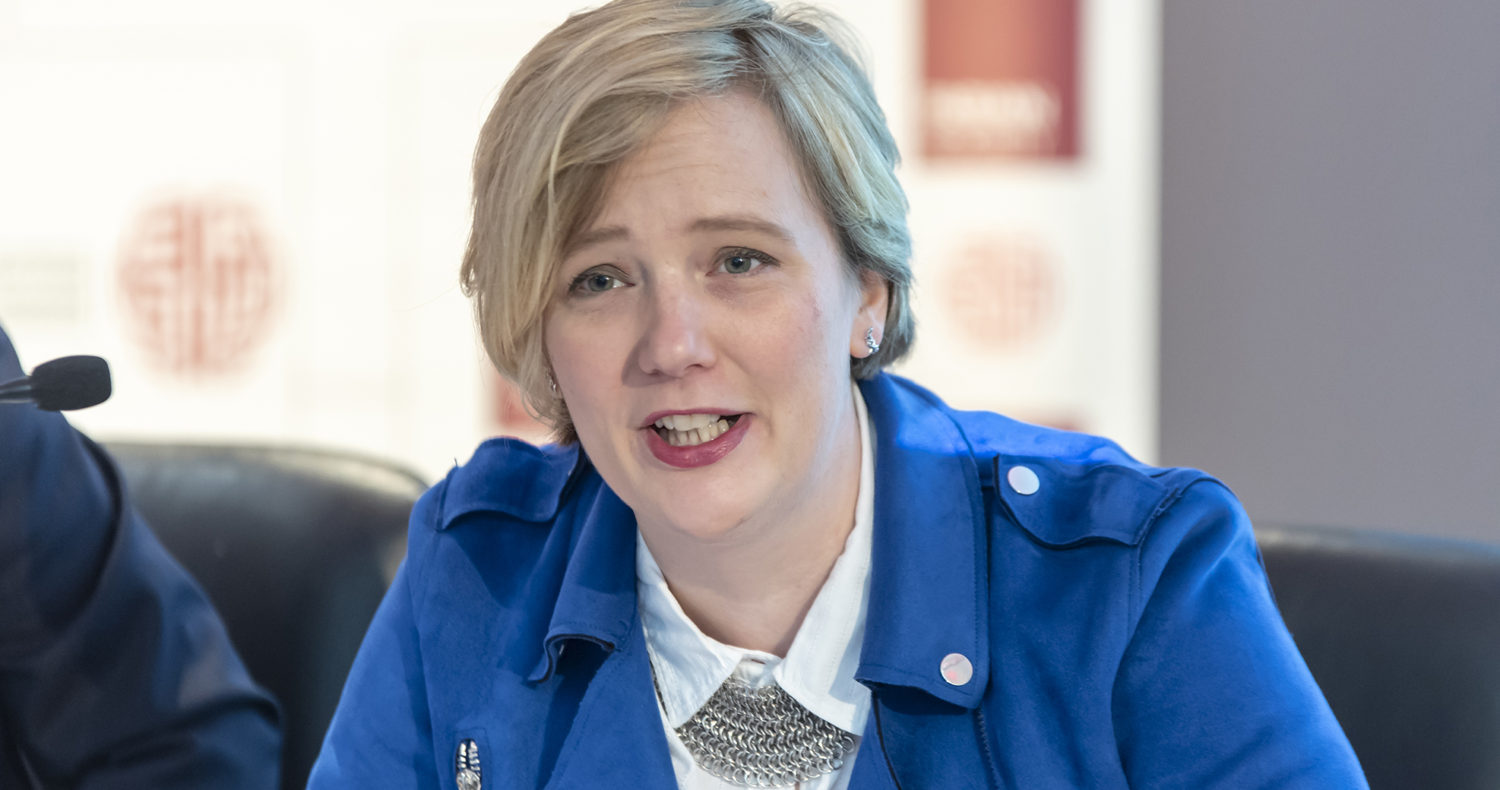Change makers
If we work together, the public and politicians can transform lives for the better, Stella Creasy tells Kate Murray.
A minority government, the Conservatives tearing themselves apart over Europe. And Labour planning what it might do in its first 100 days after forming a government. We’re not talking Brexit Britain of 2019, but the mid-1990s, when Stella Creasy spent her gap year working as a volunteer at the Fabian Society.
Creasy, now the Labour MP for Walthamstow, had just finished school in Colchester when she badgered then Fabian general secretary Simon Crine to take her on. “Poor Simon kept trying to tell me that they didn’t need anybody and I wouldn’t take no for an answer, because I didn’t live in London, I didn’t know anybody in politics. I’d been involved in setting up a young Fabian group in Colchester but I had this year of my life and I wanted to know whether politics actually was all that,” she says. It was a special time, she recalls. “I was overwhelmed making cups of tea for people like Chris Smith and Neil Kinnock and listening to them arguing out policies with people like Tony Blair. To be around that, and to hear the work that goes into being both a radical and credible government was extraordinary. And for me, having come from small town Essex thinking the only other socialist around was Billy Bragg, it was life-changing.”
For Creasy, the parallels with that time are striking, with Britain’s relationship with Europe defining both then and now what happens to governments which haven’t got a majority. But she sees a big difference too and it’s one which poses a real threat to our democracy. “There was an absolute sense then of the potential of government to change people’s lives for the better,” she says. “Now, I worry that whether people get a Labour government or a Tory government, they think we should fear governments. That’s a very different mindset. So you’re constantly having to reassure people that not only is change possible, it’s beneficial.”
Brexit is the clearest, but not the only, example of this newer sentiment at work.
“The British public are not saying ‘Tory bad, Labour good’. They’re saying ‘a plague on all your houses’ because they don’t feel there’s any potential for governments to do good. And that’s really worrying,” she says. “Throughout our history, Labour governments have dramatically transformed the lives of millions of people in this country. That’s why we do this. I remember sitting in those meetings as an 18-year-old and they were talking about ending child poverty – just mindblowing – and bringing in a minimum wage. So the potential for governments to do good things is the thing we’ve got to fight for.”
The possibility of change is the thread that runs through Creasy’s nine years as an MP. On her office wall, she has a ‘hope list’ and a ‘hit list’, setting out the issues where she is keen to make a difference.
Since 2010, she has made a name for herself for her campaigns, including a high-profile fight for better regulation of payday lenders and, this summer, progress over abortion rights in Northern Ireland. And recently she hit the headlines for, as a pregnant MP, raising the issue of maternity cover for parliamentarians. Although she’s now been promised funding for someone to cover her work, she says the wider issue has not been fixed.
“I pushed for maternity cover, not for myself, but because the idea that my constituents should be shortchanged for six months, because I wouldn’t be around if I want to spend time with my child, was completely the wrong message,” she explains. “If we can’t get it right here in parliament, where we’re supposed to be setting the laws and leading the way on making our workplaces more family-friendly and therefore our country more economically productive, what hope have we got?”
Of course, no MP can take on every issue. And here Creasy points to Nye Bevan’s famous view that the language of priorities is the religion of socialism.
“Every single issue that I’ve picked up has come from recognising the inequalities in my community – what you might argue is that the definition of inequality has to go beyond economic inequality and it has to be about social and indeed psychological inequality.”
“So we fight just as hard to take on the payday lenders, the guarantor loans, the credit card companies who are fleecing people, as we do to tackle the fact that still 51 per cent of my local community are frightened walking around the streets, because they’re women, because they get street harassment, because misogyny isn’t a hate crime in this country.”
In the last few months, one of Creasy’s top concerns has been arguing the case for citizens’ assemblies to break the deadlock on Brexit. It’s a cause which she says goes beyond Britain leaving the EU: while giving members of the public a say on Brexit could be a vital tool to help address the current crisis, citizens’ assemblies could also be part of a wider reappraisal of how we do politics in this country.
“What citizens’ assemblies do is they allow the public, and their politicians, to have a different type of conversation that is focused not on division, but on finding common ground, and finding out what people think is their priority. They are not a curative for every problem in democracy. But I think they certainly change people thinking that when there is a difficult subject on which people feel strongly and they’re very divided on, that it’s not possible to bring people together to find resolution.”
Our current system, she adds, shuts too many out. “We’ve got to get better at finding ways of bringing the public into our discussions and into our decision-making and into the delivery of services. Because they’re smart, they know what works for their communities, they know what works for their country. But our traditional forms of democracy treat them like they’re children. There is a very strong socialist case for saying the way we do politics in and of itself breeds inequality, because it requires only a certain type of voice to be heard.”
MPs, Creasy believes, don’t have all of the answers – and, in any case, collaboration works better than individual action in getting things done. All of us, not just our politicians, should see ourselves as ‘change makers’. “Sometimes being an MP can feel like people expect you to be a sort of a Mafia don: ‘You come to me, I sort your problem.’ Crazy,” she says. “I will sometimes say to people in Walthamstow ‘I’m your worst nightmare as your MP, because I’m going to get you involved’. But that’s how I know change happens – we work out a plan together about what we’re going to do.”
“The lesson I’ve learned since I was at the Fabians is that change is possible. It’s just bloody hard work. Why do we think it’s easy? This is a country that’s full of complexity. It requires all of us to be involved. The thing I hate is those people who want socialism to be a spectator sport. Because that means we pull our punches about the changes we can achieve.”
But is Labour today ready for the challenge? Creasy believes it is foolish to pretend Labour is in a good place right now. The party, she claims, has a real problem because it is not living up to its values on issues like antisemitism and sexual harassment. Speaking out in this way has led to criticism, not least on social media, where she is a prolific Twitter user, but she is unrepentant.
“If you’re having to label other people to win an argument, if you’re having to call them ‘a red Tory’, you haven’t got any politics of your own, because everyone in the Labour movement is left. The question is, what are you trying to get done? If you are sitting still, you’re not a socialist.”
“Everyone in the Labour movement right now has a choice to make: do we put party or country first?” she adds. “Putting party first means spending time ‘obsessing about how to deselect MPs and who is more loyal and shutting down debate and feeling smug’. But putting country first would mean Labour could win an election as a real alternative.”
“We could show people that change is both possible and desirable and that governments can actually transform their lives for the better not working for them, but working with them,” she says.
“People look to us for leadership in difficult times – and these are difficult times. A political movement that turns in on itself and thinks that the party is more important than the country doesn’t deserve to lead. Because at our best, we have always shown that we are fighting for the best of Britain. The National Health Service, everyone rightly cherishes it. It was the best of Labour and the best of Britain.”
As the country faces one of the biggest political crises we have seen for decades, Creasy says Labour people – and Fabians – must step up.
“When you look at what Boris Johnson is prepared to do and when you look at the rise of the far right, we’ve never needed more to be focused on what we can do for this country. I will brook no one from any wing of the Labour movement who wants to indulge anything else. Because there is too much at stake,” she says. “And where the Fabians can offer a really powerful contribution is in ideas. It’s what it’s always done. And yes, some of those ideas will get shot down. But they’ll help us on the road. When we start being obsessive, when we start pulling our punches and start trying to triangulate around people, we start justifying half-heartedness. That’s when the British people will find us wanting and rightly so. That’s what being really radical is about.”

